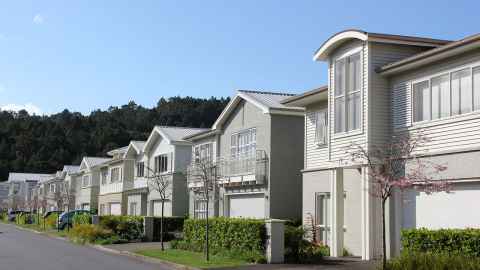Experts put Auckland’s housing rules under the microscope
6 November 2025
Experts say future housing policies must be grounded in evidence and behavioural insights.

“The next phase of housing reform won’t be defined by how much land we can rezone, but by how we translate upzoning into long-term, equitable homes,” said Associate Professor William Cheung at the University of Auckland Asia-Pacific Housing Forum 2025.
Cheung, who was joined by local and international experts to discuss the future of housing policy, affordability, and urban growth, said the forum was unanimous that upzoning (intensification) is the starting point, not the endpoint when it comes to housing policy. Success, he said, depends on aligning supply with social purpose and sustaining reforms over generations.
The forum, co-organised by the Urban Analytics and City Science Research Beacon, New Zealand Asia Institute and the Economic Policy Centre, explored how behavioural insight and evidence-based reform can shape housing policy and progress.
Cheung, co-director of the Urban Analytics and City Science Research Beacon, emphasised the need for Asia-Pacific housing policy to shift from crisis management toward evidence-driven design.
“The forum’s discussions showed that effective housing systems are those that integrate behavioural insight, institutional stability, and public trust.”
Cheung says forum panellists agreed that the ability to survive political cycles is just as critical as policy innovation.
“Governments need to design frameworks that learn and adapt, rather than reset with every administration. This means treating housing not only as an economic sector but as a cornerstone of social well-being and environmental sustainability.”

Evidence from Auckland’s zoning reform
Associate Professor Ryan Greenaway-McGrevy, Director of the Economic Policy Centre, outlined how Auckland’s zoning reform and state-led delivery reinforce one another. He argued that comprehensive, city-wide reform is what lifts supply responsiveness.
He pointed to the Unitary Plan, which upzoned land, reducing land per dwelling and enabling both private and public developers to build more homes. The share of new housing by government-controlled institutions rose from 3.1 percent in the decade preceding the reform to 9.9 percent in the six years following—levels not seen since before the 1980s economic reforms. Research indicates that the reform generated a threefold increase in state-built dwellings.
Following Greenaway-McGrevy's analysis, Dr Elham Bahmanteymouri, a senior lecturer in urban planning, said upzoning on its own doesn’t necessarily lead to affordability. Her research, presented at the forum, drew on insights from her recent book Cities and Digital Platforms (Routledge, 2025).
“We must recognise the digital dimension of housing markets,” Bahmanteymouri said. “Platforms like Airbnb can absorb part of the new supply created through upzoning, particularly in high-amenity areas.”
She called for greater data transparency, and more context-sensitive regulatory approaches that balance flexibility and efficiency. Regulation, she noted, should be adapted to each local market to ensure that digital platforms contribute positively to upzoning-related housing outcomes rather than undermining affordability.
Building on these perspectives, keynote speaker Gary Blick, chief economist at Auckland Council, added that the Auckland Unitary Plan (AUP) has had a transformative effect on housing supply.
“Widespread upzoning can be impactful,” he said, highlighting a measurable lift in housing delivery and a shift toward townhouses and apartments.
Blick noted that the AUP has upzoned around 75 percent of residential land, providing the market with more choice and competition. He pointed to research estimates that 21,800 more homes were built than would otherwise have been, after accounting for displacement. Growth has also become more concentrated, with the share of new homes built within 14 kilometres of the city centre rising from 46 percent to 51 percent when comparing the seven years before and after the AUP.
“We are seeing more homes, and more of them closer to jobs and rapid transit,” he said.

Asia-Pacific perspectives
Transitioning to international perspectives, the housing forum’s afternoon roundtable—moderated by Dr Cheung—connected Auckland’s zoning experience with wider policy debates unfolding in Australia, South Korea, and Hong Kong.
Professor Chris Leishman (University of South Australia) discussed how the Auckland model is perceived abroad.
“The Auckland upzoning has become sort of famous - or perhaps infamous,” he said. “Some housing policy researchers in Australia think it has created a problem because there’s now a view that policymakers can ignore demand factors completely, upzone, and magically supply will increase and improve affordability. This ignores the realities of developer behaviour and downplays the fact that demand-side factors remain important.”
He said that while upzoning can expand housing capacity, “evidence suggests any downward impact on prices may be temporary,” calling for a more balanced approach that integrates demand-side factors and long-term rental frameworks.

Professor Hyojung Lee (Seoul National University) cautioned that upzoning may increase inequality.
“I agree that we need to provide more housing units,” Lee said. “But I’m not sure whether that will result in more inequality between the regions. It really makes those who already own homes in downtown areas gain more, while affordability improvements are much smaller for others.”
Rounding out the session, Professor Kelvin Wong (The University of Hong Kong) offered a planning perspective on the trade-offs of density in an already vertical city.
“If you increase supply, the price should come down, but there are other consequences—environment, transportation, and infrastructure,” he said. “In Hong Kong, we are already in a very high-density city, so I believe upzoning could create a lot of negatives.”
Wong stressed the need for densification to balance affordability, liveability, and infrastructure limits.
About the Forum:
The Housing Forum 2025 formed part of the University of Auckland Business School’s activity in recognition of UN-Habitat’s World Cities Day on 31 October 2025. The event brought together experts from Auckland Council, University of Auckland, Seoul National University, the University of Hong Kong, and the University of South Australia. The morning session took place at the Sir Owen G Glenn Building, followed by an online Asia-Pacific dialogue.
Media contact:
Sophie Boladeras, media adviser
M: 022 4600 388
E: sophie.boladeras@auckland.ac.nz